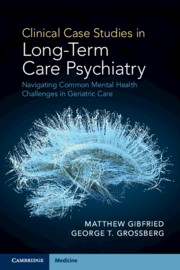 Clinical Case Studies in Long-Term Care Psychiatry
Clinical Case Studies in Long-Term Care Psychiatry PTSD
Published online by Cambridge University Press: 31 October 2024
The pharmacologic treatment of post-traumatic stress disorder attempts to alleviate the symptoms associated with the condition including anxiety, depression, and sleep disturbances. SSRIs are first-line medications and SNRIs such as venlafaxine are also effective, especially in instances where there has been a suboptimal response to SSRIs. There are quite a few options for nonpharmacologic therapy in older adults. Outcomes are best in those who participate in both pharmacologic and nonpharmacologic treatments. Some of the best outcomes are seen with cognitive behavioral therapy combined with pharmacotherapy. Follow-up for those with post-traumatic stress disorder should involve regular visits with a provider to assess response to treatment. Rating scales such as the PTSD Checklist 5 can be quite helpful in objectively assessing the severity and nature of symptoms over time. The prognosis varies widely among individuals and some patients may experience significant improvement or even full remission of symptoms over time.
To save this book to your Kindle, first ensure [email protected] is added to your Approved Personal Document E-mail List under your Personal Document Settings on the Manage Your Content and Devices page of your Amazon account. Then enter the ‘name’ part of your Kindle email address below. Find out more about saving to your Kindle.
Note you can select to save to either the @free.kindle.com or @kindle.com variations. ‘@free.kindle.com’ emails are free but can only be saved to your device when it is connected to wi-fi. ‘@kindle.com’ emails can be delivered even when you are not connected to wi-fi, but note that service fees apply.
Find out more about the Kindle Personal Document Service.
To save content items to your account, please confirm that you agree to abide by our usage policies. If this is the first time you use this feature, you will be asked to authorise Cambridge Core to connect with your account. Find out more about saving content to Dropbox.
To save content items to your account, please confirm that you agree to abide by our usage policies. If this is the first time you use this feature, you will be asked to authorise Cambridge Core to connect with your account. Find out more about saving content to Google Drive.